Are your children ready to have a cell phone? This blog post dives into the emotional, physical, and practical considerations that parents should make when deciding on the right age for their child to have a cell phone. Find out the risks, benefits, and how to manage them for the best possible outcome.
How should kids use cell phones? And at what age are they emotionally ready to have their own?
But deciding on an appropriate age for when your kid should have a smartphone is more about your specific child than it is about an arbitrary number of years they’ve reached,
parents to think about how their child interacts with the other technology in their lives and their overall maturity level. Do they know how to protect their privacy online? Do they generally show good judgment in what they share on websites and apps? Are they informed on relationship safety, especially if the kids in question are at an age when they’re dating?
Using a smartphone opens up a variety of ethical decisions for children, and the readiness to make those decisions varies by age,
It’s also important to think about how your child balances technology with other aspects of their lives. Do you have trouble tearing them from the television or their video games, or have you caught them sneaking time online? These are indications that having access to a smartphone might create problems. If a child is too young to do or know any of the above, then he or she is too young for the massive responsibility that comes with owning today’s smartphone.
Some experts said 12 was the ideal age, while others said 14. All agreed later was safer because smartphones can be addictive distractions that detract from schoolwork while exposing children to issues like online bullies, child predators or sexting.
When you hand your children cell phones, you’re giving them powerful communication and media-production tools. They can create text, images, and videos that can be widely distributed and uploaded to websites instantly. Parents really need to consider whether their kids are ready to use their phones responsibly and respectfully.
Considering these issues:
- How often does your child lose things, especially expensive things? If you tell her something is extra important, does she take special care of it, or leave it on the bus after a few days?
- How well does your child handle money? Will she be in the middle of a game and impulsively buy more lives without considering their cost?
- Consider how easily your child picks up on social cues. If she’s slow to catch on, this deficit could be aggravated in texting and posting on social media.
- How savvy is your child about technology? Does she truly understand that future college admissions staff, employers, and colleagues could conceivably see anything she posts now?
- How well does your child do with limits to screen time? If he is constantly glued to the computer or game console, he will probably have difficulty putting down the phone as well.
The not-so-smart phone
If you don’t feel that your child is quite ready to be trusted with a smart phone, one option is to provide him with a phone that allows for calling and texting but not much else. This is also a useful option if you need your child to have a cell phone for safety reasons.
If you’re ready to take the plunge
For parents who do decide to give their children fully functioning phones, experts recommend setting clear guidelines in a conversation before they receive the device. Here are some sample rules that parents can apply to their kids’ cell phone use:
- Establish that you are to know the password to the child’s phone, and that you have the right to take it away if you’re not satisfied that he’s using it wisely.
- Set limits on both general screen time and phone time. This rule especially strongly for kids who already have difficulty breaking away from a screen.
- Agree on limits to how much money is available to cover the data plan and any game or app expenses.
- Determine what the consequences will be if the phone is lost or broken. Will it be replaced? And, if so, who will pay for it?
- Specify times of the day when using the phone is not allowed, such as late at night or during family activities. No sleeping with your phone. The phone stays off during homework and family meals.
- Text and phone are not to be used for important or emotional conversations–those must still take place face-to-face. Tell your kids that the phone should not be used to hide or escape from uncomfortable situations.
- Monitor the social media sites that your kids use, and make them aware that you are doing it. Kids should act as if their parents are reading almost everything they post. And if that’s not enough of a deterrent to overshare or act impulsively, explain that they shouldn’t post anything they wouldn’t be comfortable having their grandparents read.
- While you may choose to enforce different rules, make sure they are clear from the very beginning, and establish consequences if these guidelines are not followed.
You’re training your kids to make good decisions over time, so that eventually, when they leave you, you can trust that they will make those good decisions on their own





